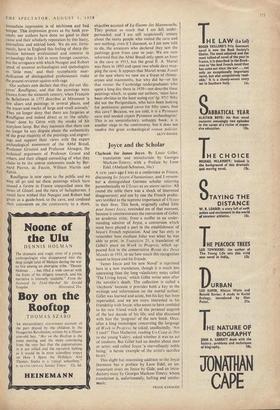Joyce and the Scholar
Claybook for James Joyce. By Louis Gillet; translation and introduction by Georges Markow-Totevy, with a Preface by Leon Edel. (Abelard-Schuman, 16s.)
.A FEW years ago I was at a conference in France, discussing ks foyers d'humanisme,.and I remem- ber a distinguished German scholar referring parenthetically to Ulysses as tut wurre raciste.' All round the table there was a shock of interested disagreement; and one by one the French profes- sors testified to the supreme importance of Ulysses in their lives. This book, originally called Stele pour James Joyce, reminded me of that moment, because it commemorates the conversion of Gillet, an academic critic, from a scoffer to an under- standing admirer of Joyce, a conversion which must have played a part in the establishment of Joyce's French reputation. And one has only to remember how exultant Jolas was when he was able to print, in Transition 21, a translation of Gillet's piece on Work in 'Progress, which ap- peared first in the conservative Revue des Deux Mondes in 1931, to see how much this recognition meant to Joyce and his friends.
'James Joyce and his new Novel' is reprinted here in a new translation, though it is much less interesting than the long valedictory essay called 'The Living Joyce,' which Gillet wrote soon after the novelist's death. The collection is called a 'daybook' because it provides both a key to the writings and information on the mortal author; Gillet was learned and acute, but his key has been superseded; and we are more interested in his friendship with Joyce, who seems to have confided to his new friend much of the personal anguish of the last decade of his life, and also discussed with him the 'pregross' of the new book. Once. after a long monologue concerning the language of Work in Progress, he asked, unaffectedly, 'Am I mad'?' Thus Mallarme, reading Un Coup de Des to the young Valery, asked whether it was an act of madness. But Gillet had no doubts about man or artist, and called Joyce 'a marvellously noble being.' a heroic example of the artist's sacrifice to art.'
This slight but interesting addition to the Joyce literature has a preface by Leon Edel, an un- important essay on Joyce by Gide, and an intro- ductory essay by Georges Markow-Totevy, whose translation is, unfortunately, halting and unidio- matic.
• FRANK KERMODE • FRANK KERMODE






























 Previous page
Previous page